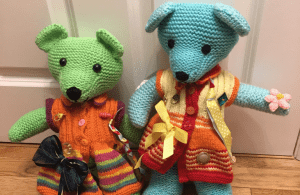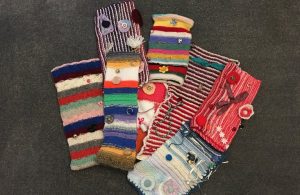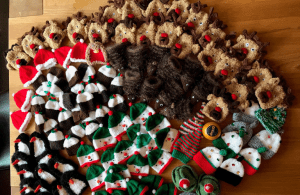
Admiral Nurse Dementia Helpline
Call or email our Dementia Helpline/Alzheimer's Helpline for reassuring and practical advice from our specialist team of Admiral Nurses.
In January 2021, the Knitting Network supported Dementia UK as their charity of the month. This partnership inspired our ‘crafty’ Corporate Partnerships Executive, Josanne, to look at the benefits of knitting and knitted goods.
I’ve used arts and crafts, mainly papercraft, as a mindful activity for some years now. Knitting is a skill that has always eluded me though.

In the past few weeks, I’ve read many articles about the benefits of knitting, and they all talk about wellbeing benefits such as stress relief, reducing depression and anxiety, and even lowering blood pressure.
One article mentioned that it was as relaxing as yoga. No wonder knitting saw a boom in 2020, with both the BBC and Forbes Magazine reporting it as a ‘cool’ activity once more. Knitting can also help to stimulate different areas of the brain and help with attention and concentration, so it led me to think it could help someone with dementia too.
I’ve been in touch with my local knit ‘n’ natter group in Sheffield for a few years now, as they have created items for my charity raffles and tombolas. When they heard I was going to work at Dementia UK, they decided to make some twiddle muffs and blankets.
I had never heard of these before and was amazed the see the range of colours, buttons, bells, and ribbons.
Our former Admiral Nurse Dave shows us examples of twiddle muffs and explains why they are useful for people in this short video.
After receiving a huge donation of knitted goods from the knit ‘n’ natter group, I spoke with Suzanne Wightman, one of our Professional and Practice Development Facilitators, about distributing them to people who need them most.

She said, “The first thing to think about when considering a twiddle muff or blanket for somebody with dementia is, ‘is that item appropriate for that person?’. Restlessness may be evident in a person with dementia but not everyone will benefit from one. However, someone with more advanced symptoms of dementia or sensory impairment such as loss of vision/hearing may benefit from a tactile, calming and comforting item like a twiddle muff or blanket. You also need to think about the quality of the twiddle muff; if items such as buttons can be removed, they could be swallowed and be a choking hazard.”
If you’re thinking about making and donating your own twiddle muffs or blankets, Suzanne suggests contacting local care homes in your community first and seeing if they are in need of any knitted goods.
It might not be a twiddle muff they are after, but perhaps a comfort blanket for someone’s knees or shoulders. Be mindful though, they may not be taking donations right now due to infection control, so this may be a project for later in the year.
To make your own twiddle muffs or blankets, you can be as creative as you like. Any colour, stitch, pattern, and accessories will do. A quick Google search will bring up lots of design ideas and patterns to help you, or you can check out this twiddle muff fact sheet, produced by the Oxford University Hospitals.
Our Volunteer Ambassador, Maureen Winfield, who nominated Dementia UK to be the Charity of the Month for The Knitting Network, uses her knitting talents to raise money for Dementia UK.

For Christmas 2020 she raised £800 for Dementia UK by making festive covers for chocolate oranges. So, even if your next knitting project isn’t going to be gifted to somebody with dementia, it could be sold or raffled off to raise money for Dementia UK.

Call or email our Dementia Helpline/Alzheimer's Helpline for reassuring and practical advice from our specialist team of Admiral Nurses.